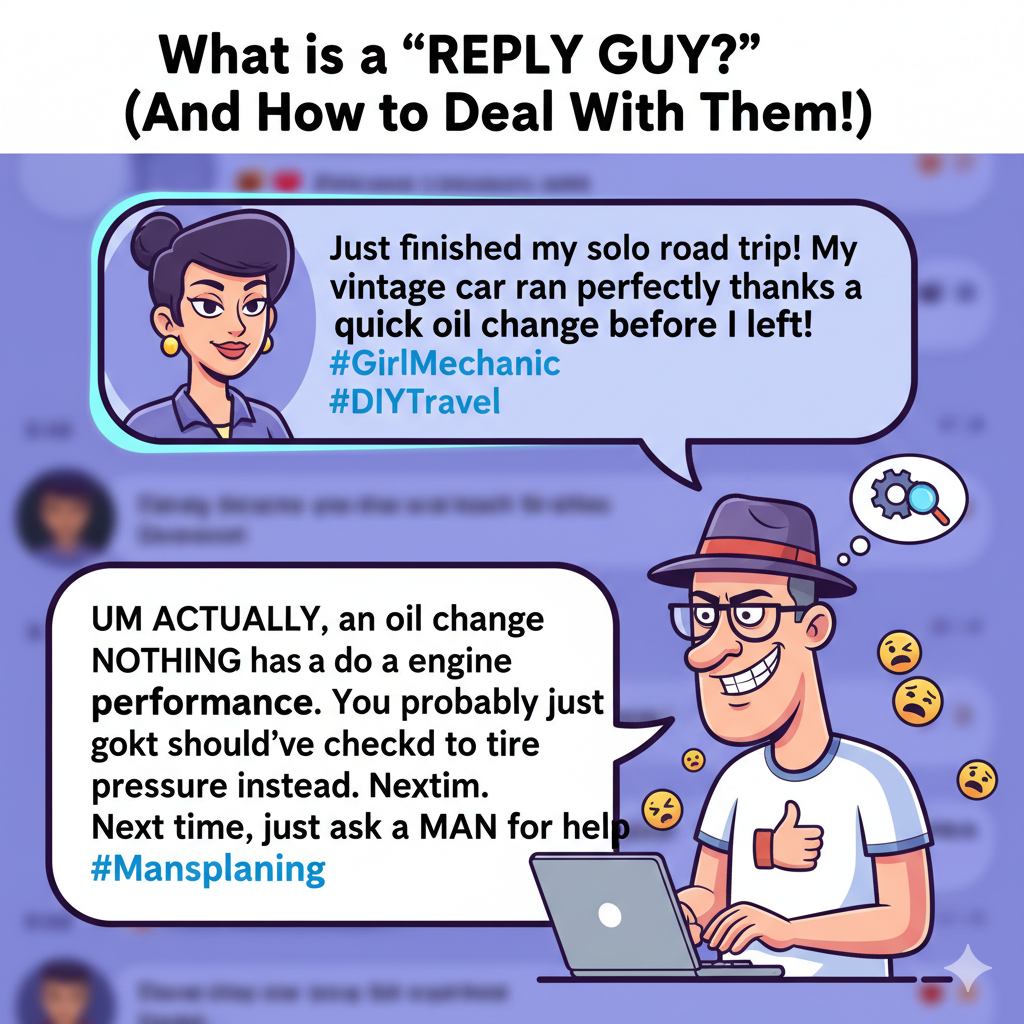- Pricing
- Social Medias supported
- Use case
What is a "Reply Guy" on Social Media? A Comprehensive Guide

Have you ever posted something on social media only to have someone jump into your comments with unsolicited advice, corrections, or explanations you never asked for? If so, you've likely encountered what the internet lovingly calls a "reply guy." This phenomenon has become so common across social platforms that it's earned its own name and recognition.
Whether you're trying to understand what makes someone a reply guy, dealing with them in your own comment sections, or maybe even wondering if you might be one yourself, this guide will help you navigate this unique aspect of online culture.
What Exactly is a "Reply Guy"?
The Core Definition
A "reply guy" is someone who consistently responds to social media posts with unsolicited advice, corrections, explanations, or commentary that wasn't requested by the original poster. These responses often come across as condescending, show-offy, or simply tone-deaf to the conversation at hand.
The term originally gained popularity on Twitter but has since expanded to describe this behavior across all social media platforms. While not always malicious, reply guys tend to insert themselves into conversations in ways that can derail discussions or make others feel uncomfortable.
.svg)
Common Platforms Where They Thrive
Reply guys can be found virtually anywhere there's a comment section, but they're particularly prevalent on:
- Twitter/X: Where quick, public responses make it easy to jump into any conversation
- Instagram: Especially on posts by influencers, experts, or public figures
- TikTok: In comment sections of educational or opinion-based content
- LinkedIn: Where professional networking can sometimes blur the lines of appropriate engagement
- Facebook: Both in personal posts and public pages
There's also tool to put your social account in a reply guy mode, use ReplyGuy, or Commentions.com
Characteristics and Behaviors of a Typical Reply Guy
Understanding the common patterns can help you identify reply guy behavior when you see it.
Unsolicited Advice and Corrections
This is the classic reply guy move. Someone shares their experience or opinion, and the reply guy swoops in with "Well, actually..." or "You should have..." without being asked. They often assume the original poster hasn't considered obvious solutions or needs their guidance.
Mansplaining and Condescending Explanations
Many reply guys engage in mansplaining, explaining something to someone (often a woman) in a condescending way, especially about topics the person clearly already understands. This can happen regardless of the reply guy's gender, though the term originally described male behavior.
Derailing Conversations
Reply guys often shift the focus from the original topic to their own perspective or expertise. A post about someone's cooking disaster might become a lecture about proper kitchen safety, completely missing the humorous or relatable intent of the original post.
Overly Enthusiastic and Uninvited Engagement
While engagement is generally positive on social media, reply guys take it too far. They might respond to every single post from certain accounts or write lengthy dissertations in response to simple observations.
The Desire to "Be Seen" or Appear Knowledgeable
Many reply guy behaviors stem from a need to demonstrate expertise or intelligence. They use other people's posts as platforms to showcase their knowledge, regardless of whether it's wanted or relevant.
Lack of Self-Awareness
Perhaps most importantly, reply guys often don't realize their behavior is problematic. They may genuinely believe they're being helpful or adding value to the conversation.
Why Do "Reply Guys" Exist? The Psychology Behind the Behavior
Understanding the motivations behind reply guy behavior can help us respond with more empathy while still maintaining healthy boundaries.
Seeking Validation or Attention
Social media can create a hunger for validation, and reply guys might see commenting as their way to get noticed and feel important. They may crave the likes, responses, or acknowledgment that comes from being "helpful."
Misunderstanding Social Cues
Online communication lacks the nonverbal cues we rely on in face-to-face interactions. Some reply guys genuinely don't realize when their input isn't welcome because they can't read the room in the same way they might in person.
Perceived Authority or Expertise
Having knowledge in a particular area can make someone feel obligated to share it, even when it's not requested. This is especially common in professional or educational contexts where people feel their expertise gives them license to correct or advise others.
The Distance of Online Interaction
The relative anonymity and distance of online interactions can make people bolder about inserting themselves into conversations they might never join in person. The screen creates a buffer that can reduce social inhibitions.
Examples of Reply Guy Interactions
Here are some typical scenarios you might recognize:
Responding to an Expert's Post with Basic Information
A climate scientist posts about their research, and someone explains global warming to them in the comments as if they've never heard of it before.
Correcting Minor Details in an Otherwise Solid Argument
Someone shares a thoughtful post about work-life balance, and a reply guy focuses entirely on correcting a minor statistic, completely ignoring the main point.
Offering Unsolicited "Help" or "Fixes"
A person posts about struggling with their garden, and multiple reply guys jump in with detailed advice even though the post was clearly just venting or looking for commiseration, not solutions.
How to Deal with a Reply Guy (If You're the Target)
If you're on the receiving end of reply guy behavior, you have several options depending on your comfort level and the situation.
Ignore and Block
Sometimes the best response is no response. If someone is consistently being a reply guy on your posts, blocking them removes the problem entirely. You're under no obligation to engage with every comment.
Acknowledge Briefly and Move On
A simple "Thanks!" or "I'll keep that in mind" can sometimes satisfy a reply guy's need for acknowledgment without encouraging further unwanted advice.
Use Humor (With Caution)
Light humor can sometimes defuse the situation, but be careful not to escalate or embarrass someone publicly. The goal is to redirect, not to shame.
Set Boundaries
It's perfectly acceptable to be direct: "Thanks, but I wasn't looking for advice" or "I've got this handled, but I appreciate your concern." Clear communication about your boundaries can be effective.
Am I a "Reply Guy"? Self-Reflection Checklist

Before you reply to someone's post, it's worth doing a quick self-check. Ask yourself:
- Is my input invited? Did they ask a question or specifically request advice?
- Is it adding value? Will this genuinely help or enhance the conversation?
- Is it necessary? Has someone already said what I want to say?
- Am I being respectful? Would I say this to someone in person?
- What's my motivation? Am I trying to help them or show off my own knowledge?
Tips for More Constructive Online Engagement
- Listen more than you speak (or in this case, read more than you comment)
- Ask permission before giving advice: "Would you like some suggestions?"
- Amplify rather than explain: Share their post instead of explaining why it's good
- Consider your relationship: Close friends might welcome input that strangers would find intrusive
- When in doubt, lead with empathy and genuine questions rather than statements
The Broader Impact of Reply Guy Culture on Social Media
The reply guy phenomenon isn't just about individual interactions—it has broader implications for how social media functions as a space for communication and community building.
Silencing Voices
When people know they'll face a barrage of unsolicited advice or corrections, they may hesitate to share their thoughts or experiences. This is particularly problematic for marginalized voices who already face additional scrutiny online.
Creating Unwelcoming Environments
Reply guy behavior can make social media feel less like a space for authentic connection and more like a place where everyone's an expert waiting to correct you. This can drive people away from platforms or make them more guarded in their sharing.
The Exhaustion Factor for Content Creators
For influencers, educators, and content creators, constantly dealing with reply guys can be emotionally draining. It can turn what should be engaging community interaction into a management task.
Moving Forward: Building Better Online Communities
Understanding the reply guy phenomenon is the first step toward creating more thoughtful online interactions. We can all contribute to healthier social media environments by being more mindful of when and how we engage with others' content.
The goal isn't to eliminate all discussion or advice-giving—these can be valuable parts of online community. Instead, it's about developing better awareness of social cues, respecting boundaries, and prioritizing genuine helpfulness over performative expertise.
Remember, behind every social media post is a real person with their own experiences, expertise, and reasons for sharing. Sometimes the most helpful thing we can do is simply listen, support, and trust that they know their own situation best.
.svg)
.webp)
.svg)
.webp)




.svg)


.svg)


.svg)
.svg)


